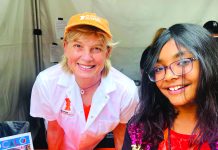Since 1975, The Los Angeles School of Gymnastics, located in Culver City, has been the go-to center for youth and young adults interested in gymnastics.
Three-time USA Olympic coach, Alla Svirsky and her daughter Tanya Berenson, former US Junior Olympian, established the school.
“Starting the Los Angeles School of Gymnastics was a natural progression,” according to Berenson.
Her first interaction began with her unique birth—she was born on a gymnastics mat. Since then, Berenson, alongside her mother, has been using her background in education, and love of coaching, to successfully run the school, which Berenson calls, “a staple to the Los Angeles community.”
The school has produced three Olympians despite the low 2 percent of the gymnastics population that sends an athlete to the Olympics.
Berenson connects the low Olympic admittance rate to the strict standards of the Olympic Games.
She remarked that, “you could rank for three years consecutively in a row as a world champion and you make one error and you’re dropped from the Olympic team on your fourth year.”
Though these harsh requirements may seem daunting to many athletes, and cause them to cave in under pressure, Berenson claims they actually strengthened her performance as a gymnast.
“ Some of the pressures in any athletic sport always helped drive me and helped me do better–with discipline and structure, you know eventually you become a success–I felt that was a good route for me,” said Berenson.
Their successes with the Olympic Games is not often found in schools of gymnastics. For the first time, the school will also be making the transition to sending a team of rhythmic gymnasts to the Maccabi Games, held in Israel, this year.
The Maccabi Games, both a spiritual and competitive athletic experience consists of an international tournament–that exposes them to the country–so it’s supposed to not only be a competitive experience its supposed to be a combined experience of sportsmanship.
“Since its inception, the mission of the school has been to not only prepare gymnasts to be international competitors that ultimately compete at the Olympic Games but also to provide programs which feed into the special Olympics and programs for children who have–drug and alcohol exposure,” says Berenson.
For budding gymnasts looking forward to competitions and tournaments, Berenson suggests to be, consistent—know that there are ups and downs with any athletic sport— and just keep trying, and practice.













